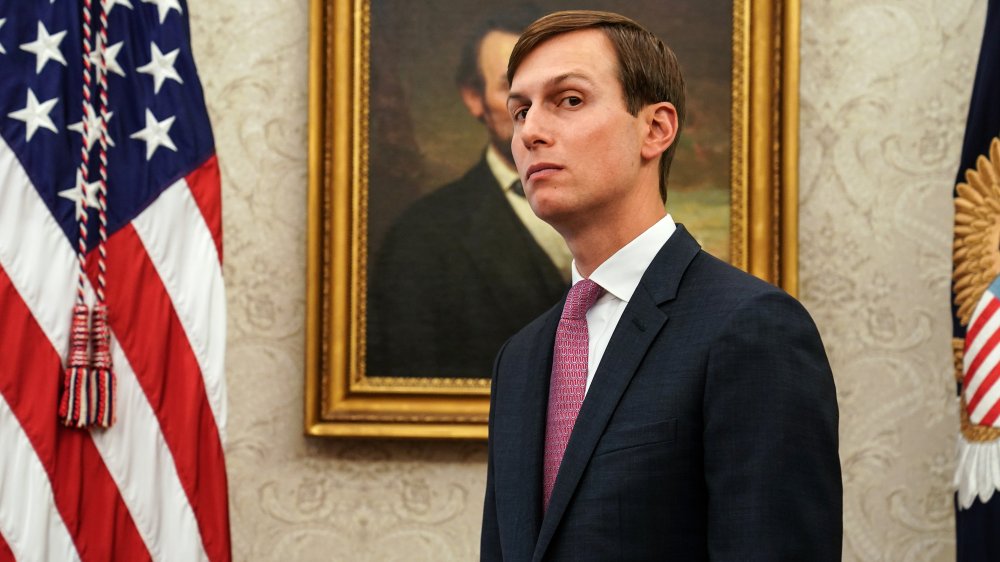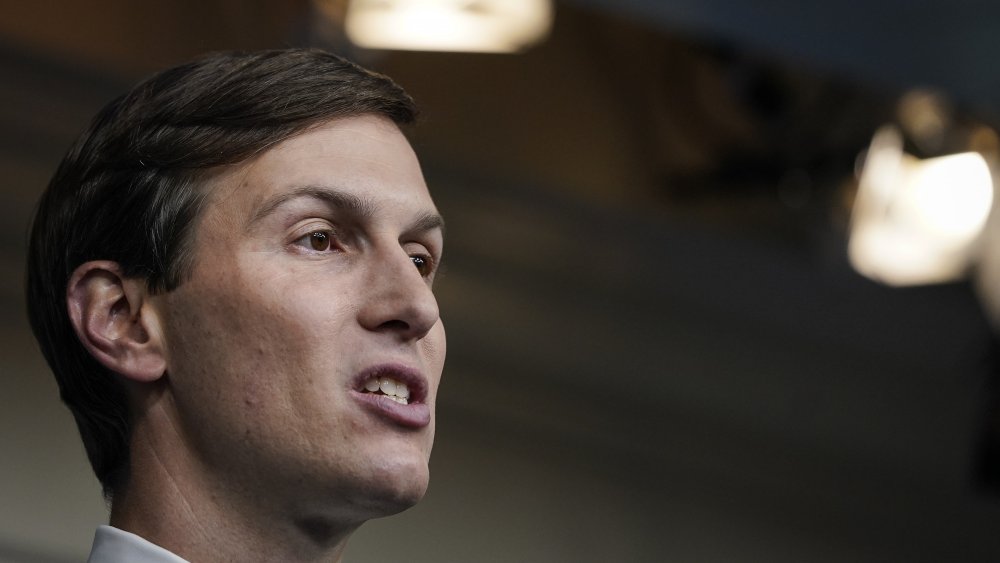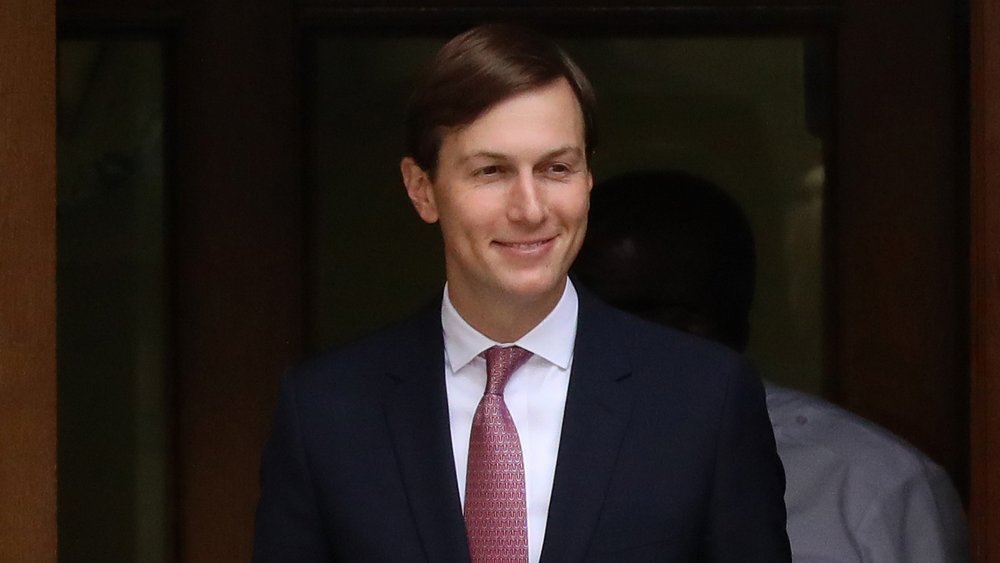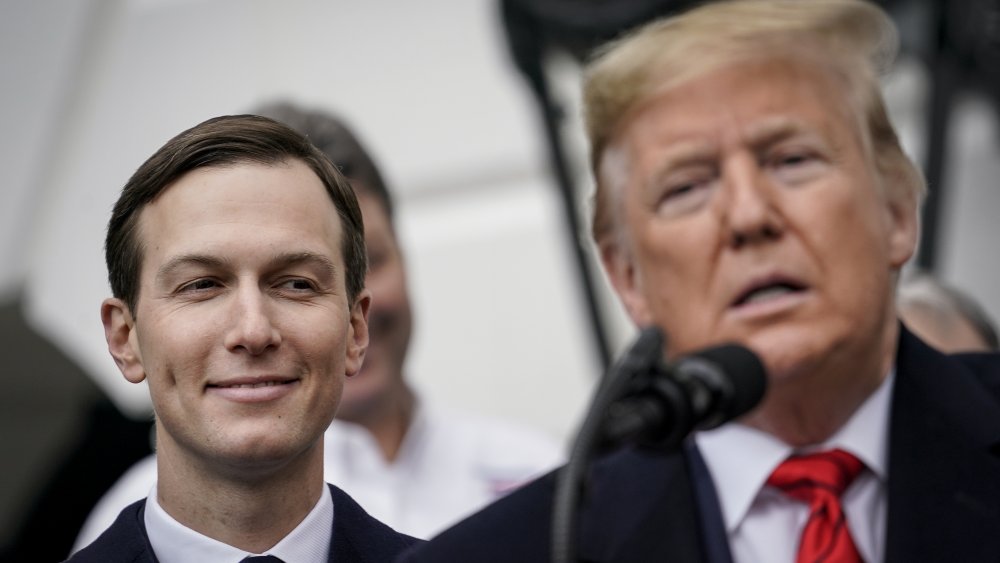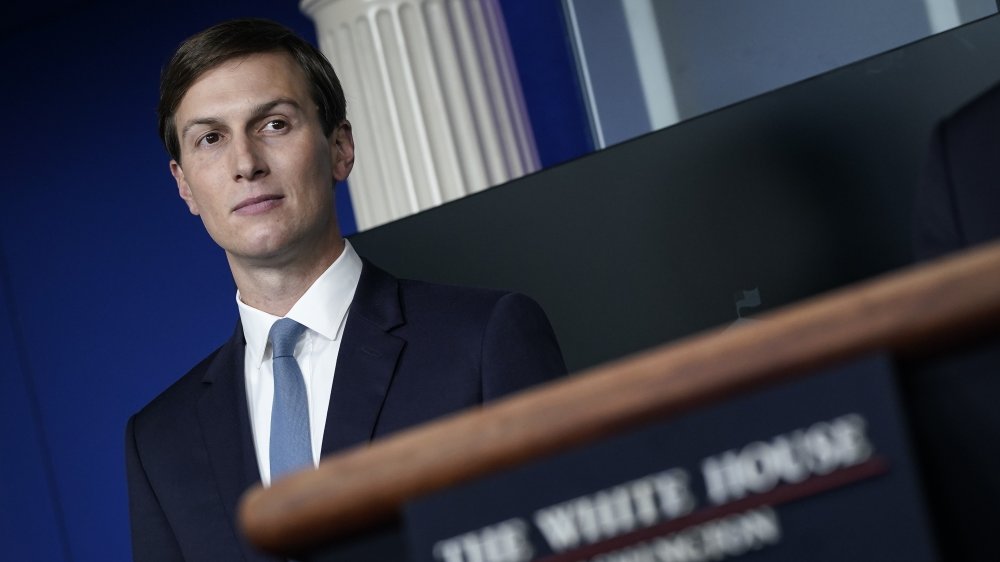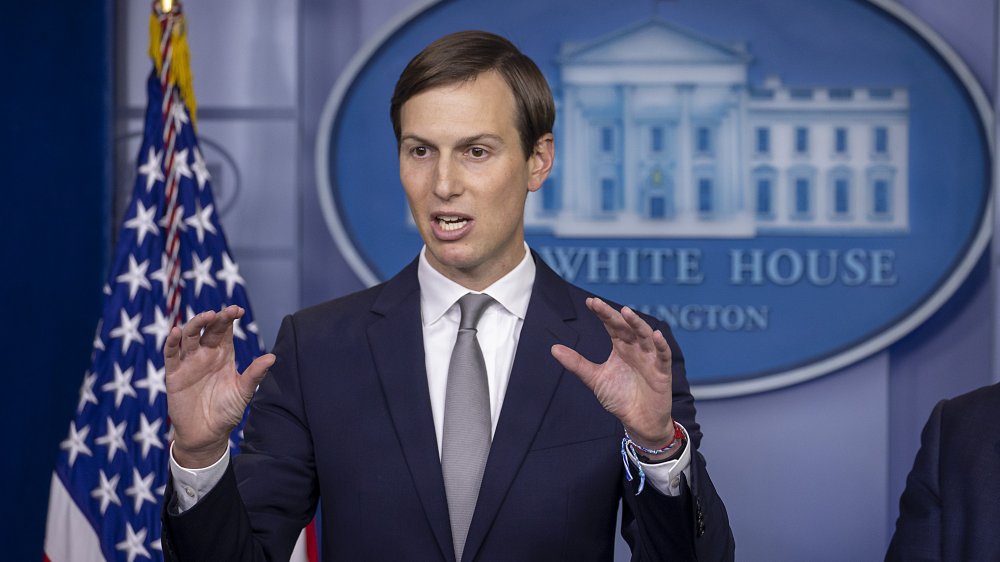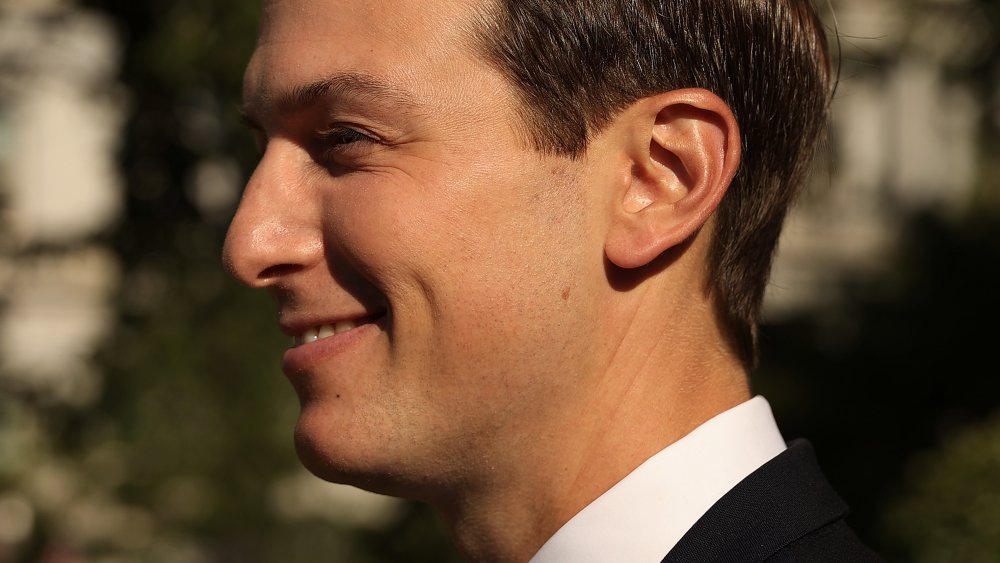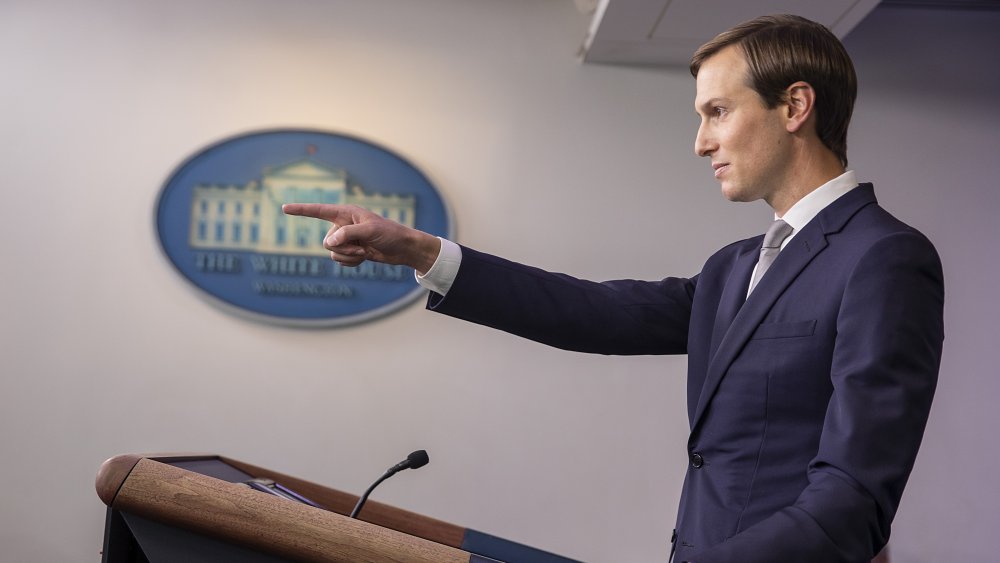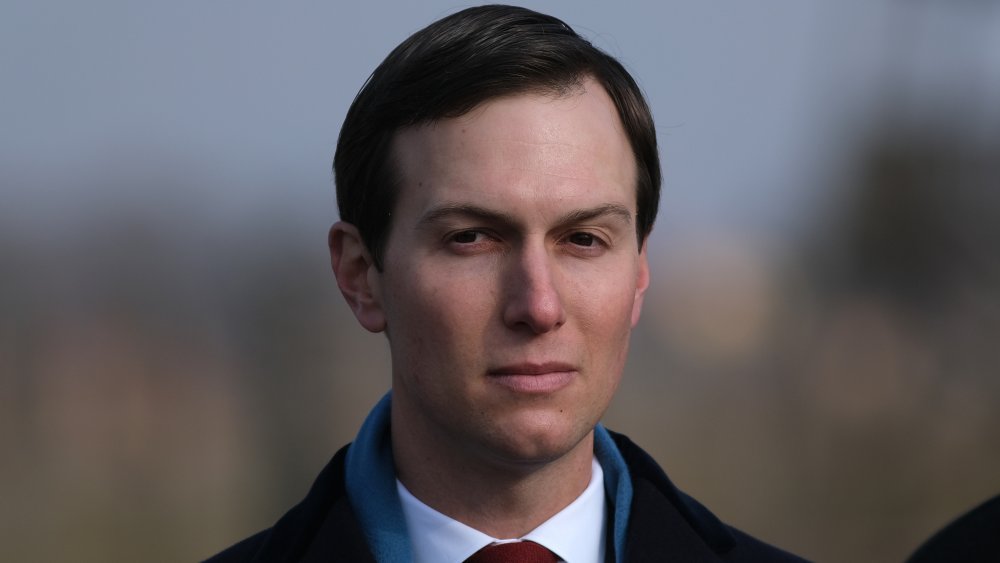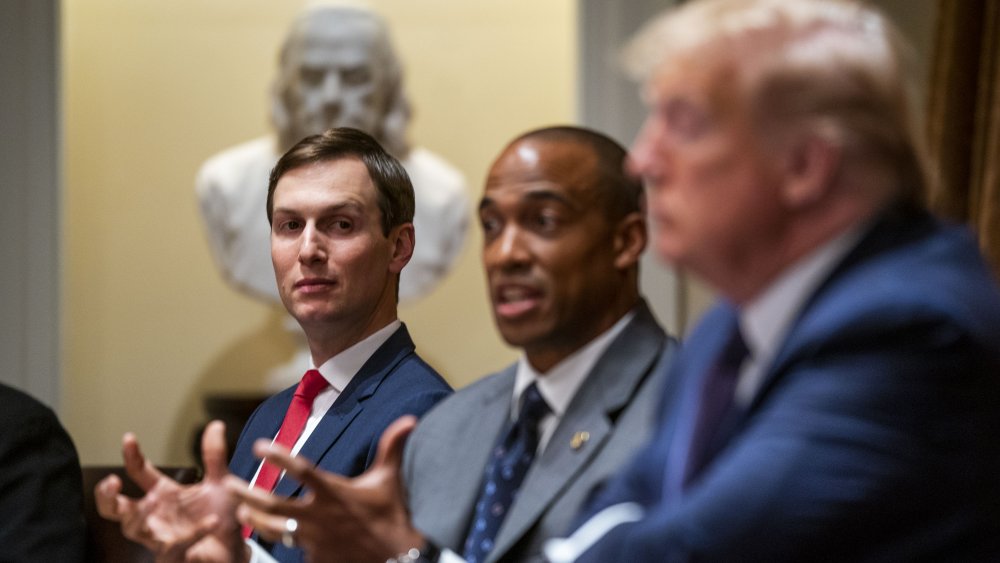The Shady Side Of Jared Kushner
After joining Donald Trump's presidential campaign in 2016 and his subsequent transition team, Jared Kushner was officially named Senior Adviser to the President once Trump took office. Widely blasted as a nepotism hire due to his marriage to Ivanka Trump, Kushner has preferred to work behind the scenes for most of his time in the West Wing. However, whenever the son of a billionaire real estate developer stops by the media or appears in a piece of investigative journalism, his ideology and beliefs come to light.
During an April 2020 appearance on Fox & Friends, Kushner touted Trump's response to the COVID-19 pandemic and promised it would be all over soon. "We're on the other side of the medical aspect of this, and I think that we've achieved all the different milestones that are needed," he said. "The federal government rose to the challenge, and this is a great success story. And I think that's really, you know, what needs to be told."
At the time of writing, we are still waiting for that success story to happen and be told. Until then, let us peek behind the curtain and take a look at the shady side of Jared Kushner.
Jared Kushner said George Floyd protests were 'virtue signaling'
During an October 2020 interview with Fox & Friends, Jared Kushner had some thoughts on the protests that erupted after the killing of George Floyd at the hands of Minneapolis police. Calling it "the George Floyd situation," Kushner said there were "a lot of people who were just virtue signaling" (via Reuters). "They'd go on Instagram and cry or they would put a slogan on their jersey or write something on a basketball court," he continued. "And quite frankly, that was doing more to polarize the country than it was to bring people forward. You solve problems with solutions."
This diatribe came while Kushner was speaking about what President Trump has supposedly done for the Black community. "One thing we've seen in a lot of the Black community, which is mostly Democrat, is that President Trump's policies are the policies that can help people break out of the problems that they're complaining about," Kushner said (via The New York Times). "But he can't want them to be successful more than they want to be successful."
Attorney Ben Crump, who represented the families of Floyd and Breonna Taylor, had some words for Trump's adviser, tweeting: "Jared Kushner speaks as if Black people are lazy complainers who don't want to be successful. This blatant DISRESPECT shows he has NO understanding of the Black community and its challenges that have spanned centuries. You can't "fix" these problems from this level of ego."
The NBA strike was dismissed by Jared Kushner
After yet another shooting of an unarmed Black man at the hands of police — this time of Kenosha, Wisconsin's Jacob Blake — the Milwaukee Bucks decided to not play their Game 5 playoff matchup against the Orlando Magic. "We are calling for justice for Jacob Blake and demand the officers be held accountable," the team said in a statement.
On CNBC's Squawk Box, Jared Kushner once again let the world know how he feels about Black men taking a stand against police brutality. "Look, I think that the NBA players are very fortunate that they have the financial position where they're able to take a night off from work without having to have the consequences to themselves financially," Kushner said. "So they have that luxury, which is great." He went on to remark that "there's a lot of activism" in the league, but believes the "slogans" should be turned into "actual action that's going to solve the problem."
Milwaukee Bucks assistant coach Vin Baker told Politico there was "a level of ignorance" to Kushner's comments, and the team's senior vice president Alex Lasry said the remarks were a "little ironic, coming from him," citing the Trump administration's response to the pandemic. "Kushner hits our guys for boycotting one game, and the people in Washington aren't really showing up for work for any of their days," Lasry said.
Jared Kushner didn't want to 'spook the markets'
Before the COVID-19 pandemic hit, many in Donald Trump's orbit believed his 2020 re-election chances were a foregone conclusion. "The economy was just steaming along, the stock market was firing on all cylinders and that jobs report was fantastic," Trump adviser Stephen Moore of the Heritage Foundation told the Financial Times. "Nobody expected this virus. It hit us like a meteor or a terrorist attack."
But while other countries were doing mass testing to mitigate the spread of the deadly virus when the outbreak started, the White House called for less. And according to an unnamed Trump confidant, the blame for that allegedly lies directly on Jared Kushner's shoulders. The anonymous source claimed that Kushner "had been arguing that testing too many people, or ordering too many ventilators, would spook the markets and so we just shouldn't do it." Apparently, that advice worked better on Trump than the advice he was getting from scientists because, as the insider said, "he thinks they always exaggerate."
However, the stock market crashed anyway, with a historic 36 million people filing for unemployment by May 2020. At the time of this writing, 898,000 more Americans filed unemployed claims last week, and many are predicting a prolonged economic recession.
Is Jared Kushner a slumlord?
Before Jared Kushner became an adviser to President Trump, he was the CEO of the real estate holding firm, Kushner Companies. Although he owned many rental properties, most of these were located in Baltimore County, Maryland. And those properties? Not good. According to the Washington Post, apartment complexes owned by Kushner companies were responsible for more than 200 code violations in 2017 alone. Repairs were apparently "made only after the county threatened fines, local officials said, and even after warnings, violations on nine properties were not addressed, resulting in monetary sanctions."
Tenants routinely reported "mouse infestations, mold problems and maggots," and a private investigator called Kushner's property management company "slumlords." According to ProPublica, the nine complexes in the Baltimore area that are owned by his company have earned the nickname "Kushnerville," and it does not exactly sound like a term of endearment. The report states that although the property is disrepair, Kushner Companies imposes aggressive debt-collection tactics and court filings to tenants who fall behind on rent.
The Baltimore Sun reported that during the period between 2013 and 2017, Kushner affiliates "sought the civil arrest of 105 former tenants." As the outlet noted, that is "more than any other landlord in the state over that time." Another report by The Baltimore Sun found, that during the same period, Kushner "filed at least 1,250 legal actions" against tenants that resulted in "garnishment of tenants' wages and property."
Jared Kushner believed Trump would 'own the open-up'
During a taped interview with famed investigative journalist Bob Woodward in April 18, Jared Kushner bragged about President Donald Trump ignoring doctors and the warnings about the coronavirus pandemic. "It was almost like Trump getting the country back from the doctors. Right?" Kushner said (via CNN). "In the sense that what he now did was, you know, he's going to own the open-up." The "open-up" in this case would be a full reopening of the economy that Kushner thought would be a winning message.
Kushner went on to say that Trump was "very smart politically" to fight with governors who wanted a shut down because "the opening is going to be very popular." He also suggested that if the governors were forced to reopen and cases spiked, the Trump administration would blame them. "But if it opens in the wrong way, the question will be, did the governors follow the guidelines we set out or not?"
During a second interview, Kushner told Woodward that they wanted to downplay the warnings of the coronavirus having a resurgence during the winter. "So if you basically say this is coming back in the fall, don't gear up, then people won't rehire, people will stay unemployed," Kushner said. "And if you're planning for the worst-case scenario, that will become a self-fulfilling prophecy. One of the things that the President's great at is he's a cheerleader. He's trying to make people feel good about the outcome."
PPE procurement was reportedly bungled by Jared Kushner
While the pandemic was raging across America in the spring of 2020, doctors, nurses, and other healthcare workers were facing mask and personal protection equipment shortages. But instead of relying on doctors with manufacturing contacts overseas, according to a report in The New York Times, Jared Kushner reportedly was adamant the private sector would provide. It did not.
The report states that when doctors and medical personnel reached out for help, instead of being met with "seasoned FEMA procurement officials," they were "diverted to a team of roughly a dozen young volunteers, recruited by the president's son-in-law, Jared Kushner." Part of the Trump's supply chain task force, the outlet continued, "had little to no experience with government procurement procedures or medical equipment" and left many of the calls and inquiries unanswered. "The nature and scale of the response seemed grossly inadequate," a volunteer told the publication. "It was bureaucratic cycles of chaos."
In once instance, when Yaron Oren-Pines, an electrical engineer in Silicon Valley, promised he could manufacture and deliver ICU ventilators, Kushner's team recommended him to federal officials without verifying his claim. New York immediately awarded him a $69 million government contract. He didn't deliver a single ventilator. "There's an old saying in emergency management — disaster is the wrong time to exchange business cards," said Tim Manning, a former FEMA official said. "And it's absolutely the wrong time to make up new procedures."
Did Kushner scrap his COVID plan for political reasons?
According to Vanity Fair, Jared Kushner scrapped his plan for aggressive national testing when he thought the virus could be used as a political weapon. The plan, led by handpicked "young business associates" and "top experts from the diagnostic-testing industry," would have "set up a system of national oversight and coordination to surge supplies, allocate test kits, lift regulatory and contractual roadblocks, and establish a widespread virus surveillance system by the fall, to help pinpoint subsequent outbreaks" instead of having each individual state compete for those resources.
However, when the COVID-19 pandemic outbreak in America first began, it disproportionately affected Democrat-controlled states due to population size and a freak nursing home outbreak in Washington. "The political folks believed that because it was going to be relegated to Democratic states, that they could blame those governors, and that would be an effective political strategy," a public health expert who worked with the White House's official coronavirus task force claimed, adding that "it was very clear that Jared was ultimately the decision maker as to what [plan] was going to come out."
So what happened to the plan? It "just went poof into thin air," a member of the team said. White House press secretary Kayleigh McEnany claimed Vanity Fair's article "consistently misstates and misrepresents" and was "completely incorrect in its assertion that any testing was stopped for political or other reasons."
Jared Kushner's Harvard acceptance seems pretty shady
In 1998, Jared Kushner's father, New Jersey real estate developer, Charles Kushner, donated $2.5 million to Harvard University. That same year, Jared graduated from the private New Jersey high school, The Frisch School. You see where this is going. In 1999, Jared was accepted into Harvard. So did he have the grades to get accepted and his father just donated out of the kindness of his heart? We'll let a former administrator from Frisch explain.
"There was no way anybody in the administrative office of the school thought he would on the merits get into Harvard," he said (via ProPublica). "His GPA did not warrant it, his SAT scores did not warrant it. We thought for sure, there was no way this was going to happen. Then, lo and behold, Jared was accepted. It was a little bit disappointing because there were at the time other kids we thought should really get in on the merits, and they did not."
A spokesman for Kushner Companies said the allegation that the elder Kushner bought Jared's way into Harvard "is and always has been false," noting that Jared's parents have additionally "donated over 100 million dollars to universities, hospitals and other charitable causes." Daniel Golden, who made the allegation in his 2006 book, The Price of Admission, states he called Harvard to determine if this allegation was true, to which they responded: "You know we don't comment on individual applicants." They then hung up.
Did Jared Kushner use his White House position to get a loan?
According to a report by The New York Times, Joshua Harris, a private equity billionaire and founder of Apollo Global Management, made frequent visits to the White House to "advis[e] Trump administration officials on infrastructure policy." During his visits, Harris "met on multiple occasions with Jared Kushner" and discussed a possible job for Harris in the administration.
Harris never got a job, but his firm later loaned $184 million to Kushner Companies, making it "one of the largest loans Kushner Companies received" in 2017 and "triple the size of the average property loan made by Apollo's real estate lending arm." So, what was the largest loan Kushner's family real estate business received that year? That would be $325 million from Citigroup "shortly after" Kushner had a White House meeting with Citigroup CEO Michael L. Corbat.
Considering the size and timing of these loans Kushner received, ethics questions were raised. "This is exactly why senior government officials, for as long back as I have any experience, don't maintain any active outside business interests," Don Fox, President Obama's acting director of the Office of Government Ethics told The New York Times, adding, "The appearance of conflicts of interest is simply too great." Representatives for Apollo and Citigroup stated that Kushner had no role in the loans granted to Kushner Companies. A spokesperson for Kushner's lawyer echoed the sentiment, additionally claiming his client "has followed ethics advice" of the Trump administration.

